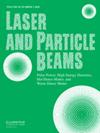Flux and estimated spectra from a low-intensity laser-driven X-ray source
IF 1.9
4区 物理与天体物理
Q4 PHYSICS, APPLIED
引用次数: 0
Abstract
Laser-driven X-rays as probes for high-energy-density physics spans an extremely large parameter space with laser intensities varying by 8 orders of magnitude. We have built and characterized a soft X-ray source driven by a modest intensity laser of 4 × 10低强度激光驱动 X 射线源的通量和估计光谱
激光驱动的 X 射线作为高能量密度物理学的探测器,其参数空间跨度极大,激光强度相差 8 个数量级。我们建造了一个由 4 × 1013 W/cm2 的中等强度激光驱动的软 X 射线源,并对其进行了表征。发射的 X 射线由金刚石辐射探测器和滤波软 X 射线照相机测量。对铝、钛、不锈钢合金 304、铁、铜和锡靶的材料依赖性研究表明,5μm 厚的铜箔产生的 X 射线产量最高。由于不透明性和流体动力分解时间的影响,激光方向的 X 射线发射和反向发射在很大程度上取决于箔的材料和厚度。时间变化的 X 射线信号用于测量材料的减薄率,在测试的材料中,减薄率为 ∼1.5 μm/ns,这意味着热温度约为 0.6 eV。铜靶的 X 射线光谱在 ∼2 keV 处达到峰值,在 4 keV 处没有发射。使用 HELIOS-CR 进行的一维流体力学和光谱计算与实验结果基本一致。强度适中的激光器是纳秒级软 X 射线猝发的绝佳来源。
本文章由计算机程序翻译,如有差异,请以英文原文为准。
求助全文
约1分钟内获得全文
求助全文
来源期刊

Laser and Particle Beams
PHYSICS, APPLIED-
CiteScore
1.90
自引率
11.10%
发文量
25
审稿时长
1 months
期刊介绍:
Laser and Particle Beams is an international journal which deals with basic physics issues of intense laser and particle beams, and the interaction of these beams with matter. Research on pulse power technology associated with beam generation is also of strong interest. Subjects covered include the physics of high energy densities; non-LTE phenomena; hot dense matter and related atomic, plasma and hydrodynamic physics and astrophysics; intense sources of coherent radiation; high current particle accelerators; beam-wave interaction; and pulsed power technology.
 求助内容:
求助内容: 应助结果提醒方式:
应助结果提醒方式:


